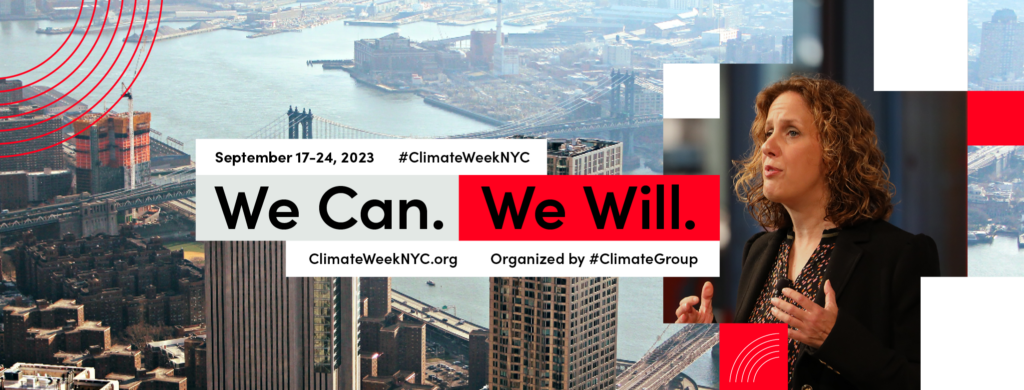Whyalla featured on hit documentary series Australian Story
In September 2018, the ABC’s hit documentary series Australian Story tracked ...

Climate Week NYC is the largest annual climate event of its kind, bringing together some 400 events and activities across the City of New York – in person, hybrid and online. Each year, business leaders, political change makers, local decision takers and civil society representatives of all ages and backgrounds, from all over the world, gather to drive the transition, speed up progress, and champion change that is already happening.


This year, Climate Week NYC took place from September 17-24, in partnership with the United Nations General Assembly (UNGA), and GFG Alliance’s Global Head of Energy and Sustainable Projects, Stefan Håkansson, attended the event and gives us an insider’s view on what took place.

It was an engaging and intense week in New York! I had the privilege of meeting and interacting with people from around the world and reflect on the need for a comprehensive climate change strategy that includes a shift from fossil fuels towards renewable energy and the adoption of green solutions. My immediate reflection was that climate concern has got a deeper and broader impact on business. Companies from all industries from cosmetics, pharmaceutical, postal services, software, even coffee producers and many more, are now part of a conversation previously limited to hard to abate industries like Steel, Cement, Energy and Automotive.
True, it is debatable if they are here to position themselves to protect their brand’s reputation and business from NGOs and naysayers, or if they are here to make a true impact and develop the business ahead of competition, to be part of a meaningful dialogue.
My view falls to the latter, and I remain optimistic that ultimately, we are all here to bring about comprehensive change. Companies are increasingly seeing a competitive advantage when addressing value chain through a sustainability lens.
The conference started with presentation by Suhail Mohamed Al Mazrouei – UAE’s Minister of Energy who talked about the collaboration between the UAE state, the Masdar and US State and investment funds, to build 100 GW renewables by 2035 and allocating 100bn US to do this. A model for partnership that I think sets the stage for how projects in sustainability can progress and be brought to life.

The days were filled with invigorating conversations, and I met a range of experts across industry and policy. A singular message resonated amongst them – the knowledge that whatever we build or invest in, must be future proof.


H.E Razan Al Mubarak – is the president of the International Union for Conservation of Nature (IUCN) and serves as UN Climate Change High-Level Champion.

She started off a particularly interesting session with focus to understand and discuss the hurdles to get financing for green Hydrogen solutions. Have a look at her recent op-ed feature, published in ImpactAlpha in the lead-up to her presentation.
It was a reiteration that while our way to decarbonise is the right way, we also need to find a credible way of certifying what we are doing, and independently verified.
One way of verifying this is to win awards, to work with Academia and Universities, to get certifications, and to further open our business to schools and media. ALVANCE’s latest award win is a great example. During the conference I met with representatives from Universities in Denmark, Holland, Germany, US and Japan, who are all open to long term partnerships and collaborations, and reaffirmed this view. Engagement with universities would necessitate a long-term commitment such as financing programs for 6-10 years.


It was particularly invigorating to engage with a range of media analysts from different media organisations such as Bloomberg. Their experts on heavy industries and biodiversity were quite amazed by our strategy with DRI and EAF plans, and early ideas on Energy solutions. They were especially impressed that we are a global player and in all parts of value chain. They see this as real USP (unique selling proposition) and makes our strategy with DRI and EAF real. Much more than others that have same strategy.
I came away with lots of new ideas on engaging three-way partnerships, and working with green investors.
Speed of decarbonisation – several presenters advocated that players like us need to think differently to have local communities more amenable to allow for faster permit processes, and find engaging ways to make them more proactive in driving change. During the course of the event, it became evident that participants were in agreement that bureaucracy and permits were the biggest barriers to the speed of decarbonisation. The idea of crowdfunding as a way to circumvent the barriers of getting permits was a solution that was actively discussed. There was a keen debate around how this can be achieved, and my conclusion is that local relationships is key in any event for a business like ours, we need to invest time to continuously engage locals in what we do, and what we want to accomplish. The GFG foundation is a stellar example of how we do this, and the role it plays in creating impact on local communities.
A lot of the commentary at the Conference was around funding – a complicated prospect as not all countries are clear on what is required. However, this is a critical success factor to be able to speed up decarbonisation; to make investment cheaper and efforts more credible. So, what does it take for projects to win funding? (These criteria are already followed at GFG)

Finally, a short reflection on Partnerships – there were a lot of discussions on what is a successful partnership. Almost all participants I met agree that partnerships are crucial to any successful project. It appeared to me that we have made a paradigm shift in our thinking. For example, NGOs who were previously reticent to engage and had a history of holding conflicting views, are at the table for open dialogue. To see large energy companies alongside NGOs, is telling in that we need to examine similar partnerships ourselves.

Leave A Reply